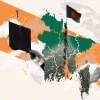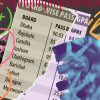Md Moynul Islam’s story calls for a profound shift toward inclusion

For those who are visually impaired in Bangladesh, the educational path is strewn with obstacles. Yet, Md Moynul Islam, a student at Iqra Commerce and BM Institute, Narayanganj, defied these odds, achieving GPA-5 in the 2024 HSC exams.
Moynul's vision began to fade as an infant, and by fifth grade, he was entirely blind due to retinal damage. According to diagnostic reports from Islamia Eye Institute and Sankara Nethralaya, his left eye was severely damaged and required removal, followed by the placement of a prosthetic eye. His right eye, while initially functional, underwent progressive retinal deterioration, ultimately resulting in complete vision loss.
The medical evaluations detailed extensive retinal scarring and detachment, confirming that surgical intervention was not a viable option. These reports emphasised the need for accessibility-focused education and adaptive measures for his vision impairment.
"I realised then that my education would be different, but I refused to give up," he shared. Moynul's journey is fueled by his family's steadfast support, especially his mother's dedication to his education after his father's passing in his early years.
For Moynul, technology was both a lifeline and a challenge. With braille textbooks being unavailable beyond primary school, he relied on screen readers like NVDA (NonVisual Desktop Access) and JAWS (Job Access with Speech), which convert on-screen text to speech. These tools enabled him to navigate and type but mastering them took a lot of work.
"It was overwhelming at first," he said. "I had to memorise countless shortcuts and adapt to interfaces without guidance."
Determined to keep pace, Moynul taught himself to use Microsoft Word, Excel, and Python, customising software like Visual Studio Code to meet his needs. He also spent hours converting textbooks into audio formats – a costly and exhausting process often done with help from teachers or local computer shops.
Learning was harder without proper guidance, but Moynul learnt to thrive in a system designed without students like him in mind. "There were moments when it felt overwhelming," he admitted. "But every time I overcame a hurdle, it reminded me that I had to keep pushing forward, not just for myself, but for others like me."
Visually challenged students in Bangladesh depend on scribes – people who transcribe exam answers as directed by the students to complete their examinations. Usually, the scribes help during tests either as junior students or volunteers.
Finding scribes was another challenge for Moynul. He often relied on untrained juniors or friends through personal networks, which turned exams into a test of patience and adaptability. According to Moynul, this unofficial approach stresses the systematic obstacles students who are visually impaired in Bangladesh must overcome, which brings into question the need to ensure equitable educational opportunities.
Moynul's achievements have earned him accolades, including an honour from the National Disabled Development Foundation in 2023, and an Imdad-Sitara Khan Family Foundation one-time scholarship of BDT 10,000 in 2024 based on merit. Aspiring to study Computer Science, he dreams of advocating for accessible resources for the visually impaired.
Currently, Moynul is preparing for university entrance examinations and searching for institutions that address his accessibility needs.
"I want to make a difference so others like myself can access the skills they need to succeed," he said, envisioning a Bangladesh where the disabled are seen as assets.
Moynul's story highlights the urgent need for accessible technology in Bangladesh, especially AI-powered smart glasses that could transform daily life with features like text-to-speech, object recognition, and navigation assistance. Yet, most life-changing tools remain beyond reach due to high costs and limited government support. "These tools could change lives," shared Moynul, "But without backing, they're a distant dream."
Bangladesh's limited investment in assistive tech, braille resources, and institutional support is more than a social oversight. It's a missed chance to empower resilient, talented individuals. "I may not see," Moynul reflected, "However, I dream of a world that values our intellect."
His journey highlights that what we perceive as accessible often remains out of reach for many. It underscores the transformative potential of accessible technology – a prospect that must be unlocked to empower everyone, not just a privileged few. For Bangladesh, this is not merely an act of charity but a necessary investment in its future, ensuring that the visually impaired can realise their full potential and contribute meaningfully to society.

 For all latest news, follow The Daily Star's Google News channel.
For all latest news, follow The Daily Star's Google News channel. 








Comments